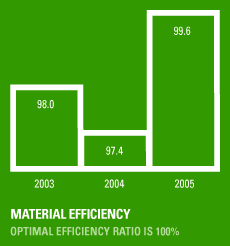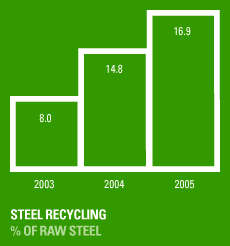YOU ARE HERE: CSE Report 2005 > Environment > Material Efficiency

BlueScope Steel is committed to waste minimisation and recycling, in order to reduce the amount of waste going to landfill.
We have implemented a number of initiatives to reduce the generation of waste materials, reuse waste materials in the steelmaking process and recycle waste materials offsite, in some instances finding alternative markets.
These initiatives have significantly reduced the amount of waste going to landfill, which is now only used as a last resort.
A whole range of innovative uses have been found for steelmaking by-products and associated waste, from road base, concrete and cement, to garden mulch.
Many steelmaking by-products are recycled into the steelmaking process, including dusts, greases and oils, and refractories. Associated wastes are also recycled, including concrete, which is broken up and sold as aggregate, bulk plastic bags and timber, which is either reused or mulched and used on gardens.
A number of our operations are also implementing innovative ways to reduce the packaging materials used to transport products between our sites and to our customers, preventing hundreds of tonnes on waste materials going to landfill each year.
The international steel industry measures material efficiency by how well a company optimises the raw materials it uses to produce products, while minimising waste. The optimal efficiency ratio is 100 per cent.
In 2004/05, BlueScope Steel achieved a material efficiency of 99.61 per cent, against a world steel average of 97 per cent.


